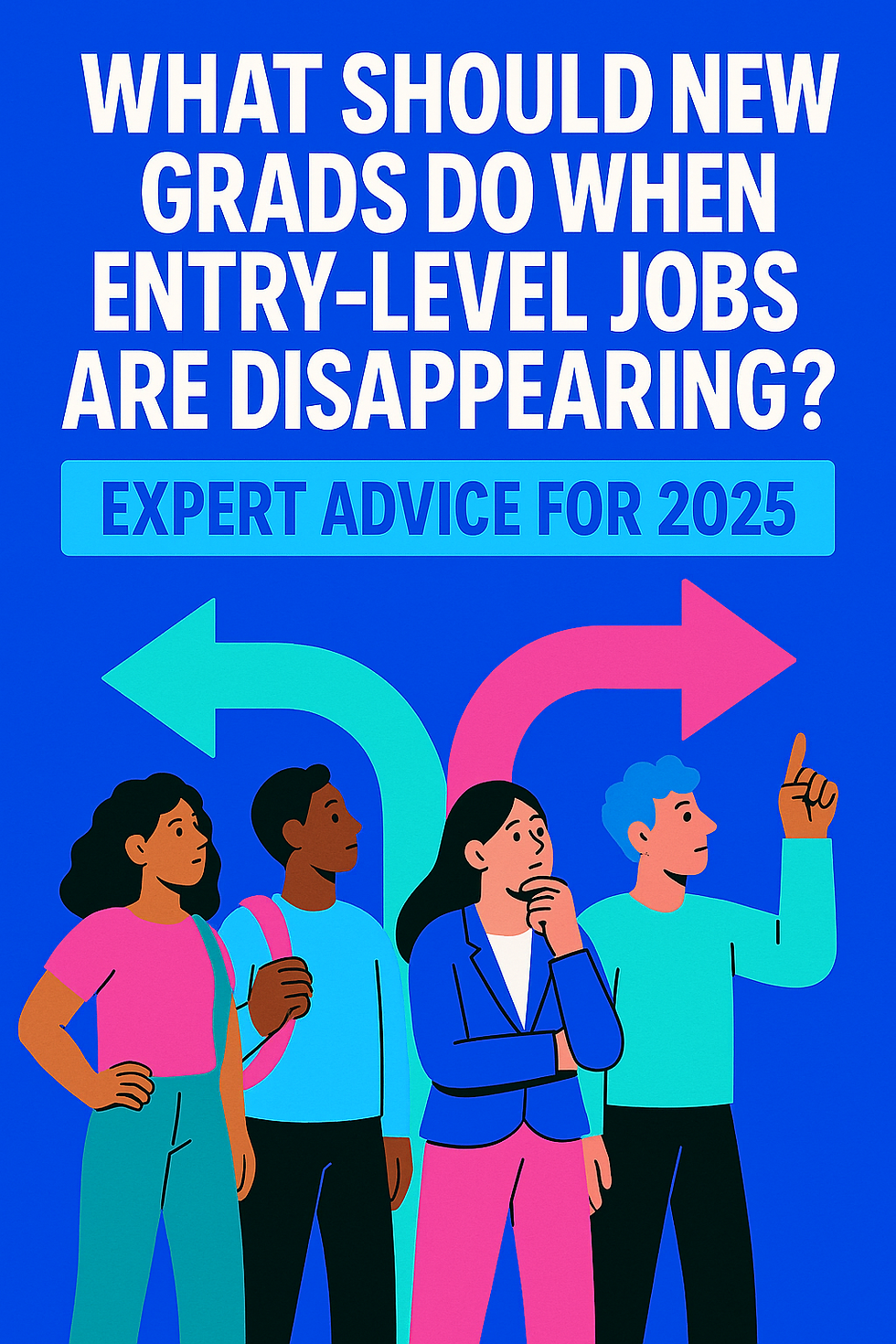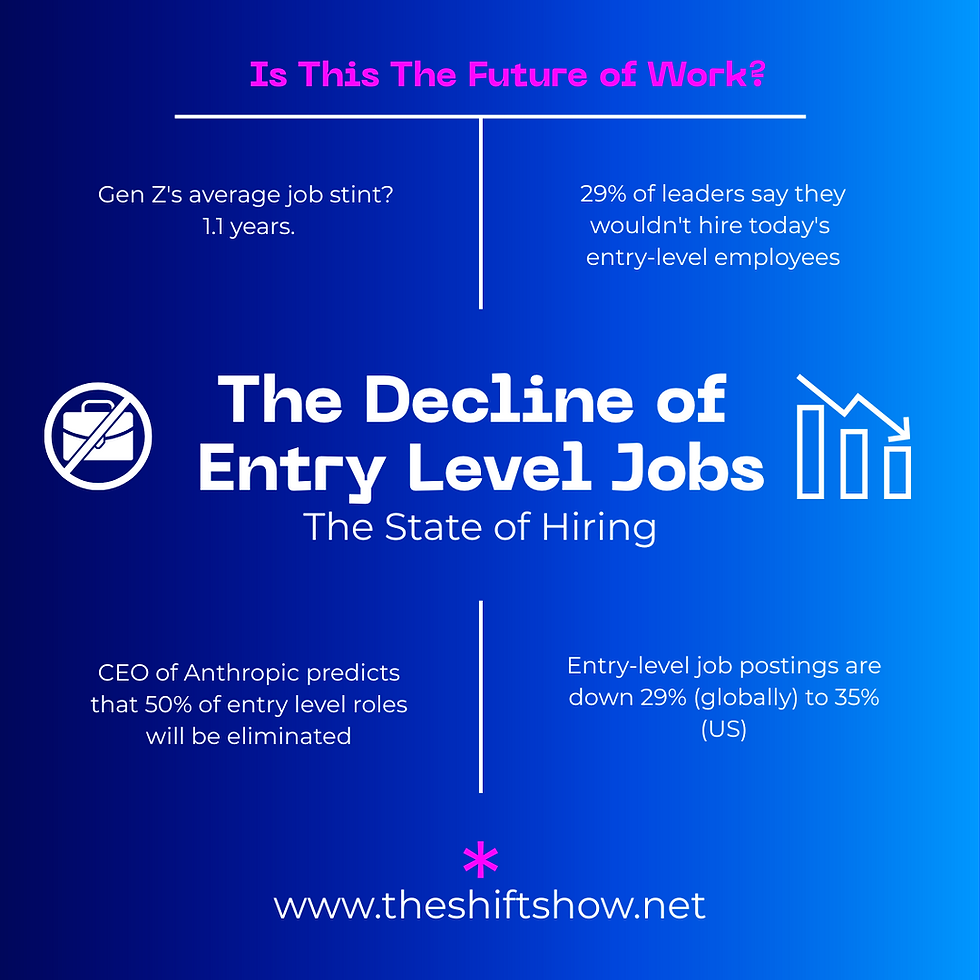What Should New Grads Do When Entry-Level Jobs Are Disappearing? Expert Advice for 2025
- Rachel Bourne
- Sep 28, 2025
- 3 min read

Okay, I need to talk about something that's keeping me up at night.
From family to friends, I had more parents call me about career coaching, resume reviews, or job hunting support for their recent graduates than I've ever had before (and I've been heavily involved in large volumes of early career hiring for almost a decade).
September has brought us these stats and...yikes:
29% of leaders say they wouldn't hire today's entry-level employees (General Assembly/Unleash
Gen Z's average job stint? 1.1 years. ONE POINT ONE. (Randstad)
Global entry-level job postings are down 29% since January (Randstad) and the US is down 35% (CNBC)

As someone who went to grad school during the Great Recession (unemployment was finally starting to drop when I graduated), I remember that stomach-dropping feeling of sending out resume after resume into the void. BUT, for every Dario Amodei of Anthropic, who thinks AI could automate 50% of entry-level white-collar jobs, there is a Francine Katsoudas from Cisco who says that early career hiring slow down is a "blip" and short-term.
I know that isn't exactly reassuring but, what do we do now?
Because sitting around panicking isn't exactly a career strategy.
If you're a parent or mentor
(looking at you, fellow parents trying to guide our kids through this mess).
Your kid needs more than a good GPA. They need:
Real experience. Even job shadowing counts, especially at the Freshman level. And make sure it's in their field.
Those "soft skills" everyone keeps talking about? (spoiler: they're not soft, they're essential). Make your kids talk to you at dinner.
Stories about what makes them special and different. Help them see it and say it. "I'll take any job" doesn't help them stand out in a sea of great young professionals.
If you're a student or early career professional:
Listen, I've been on both sides of the hiring table. I know it’s TOUGH right now. Here's what actually works (I’ll do a post for active seekers soon):
Internships > perfect resume. Start small, build to more competitive companies. Get three if you can, one every summer. I’ve seen too many kids who spent their summers working in restaurants but looking for engineering or finance full time.
Be the person people want to work with. AI can code, but it can't build trust with your team.
Go to all hiring fairs that you can and be BFF with the Career Center if you’re still in school. Many companies move fast to secure talent early and there's a real bias that the best talent gets chosen in Fall (also categorically, untrue).
Look for rotational and development programs. They're a safe bet and offer incredible skill and experience for the next role but make sure there is a formal process for placing you once the program is over.
Start building your reputation now. Not your resume. Know what makes you special. Ask your friends why they want to be friends with you (and we don't count those wild nights out).
After tons of Future of Work research for The Shift Show, here's what's actually going to matter:
✨ Adaptability (Pivoting quickly when work needs it and embracing change with a can-do attitude) and Resilience, can you bounce back from the unsuccessful interview?
✨ Communication (can you explain complex stuff simply? Gold. But don't forget active listening).
✨ Collaboration (Do people want to work with you? Remember all those "group projects"? They never end).
✨ Growth Mindset (People want to invest in that young graduate who is eager to learn and grow).
✨ Emotional Intelligence (Do you understand yours and others’ emotions to build stronger relationships?).
Look, almost every generation has a serious challenge where the world is ending when they graduate.
Mine had the financial crisis and "the great recession".
Yours has AI.
But you know what? You're not a statistic.
The young professionals who'll thrive? They're the ones building real skills, finding mentors who believe in them, and staying curious even when it's scary.
The world of work IS shifting fast. But that's exactly why we need fresh perspectives.
Early Career roles aren't going anywhere – they're our future.
Besides, someone has to manage the Bots one day, right?

Comments